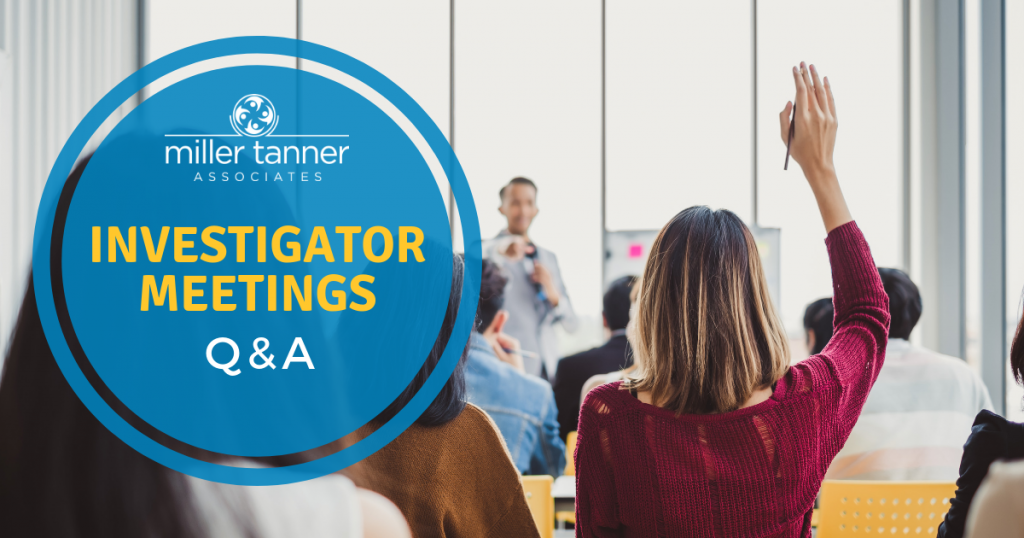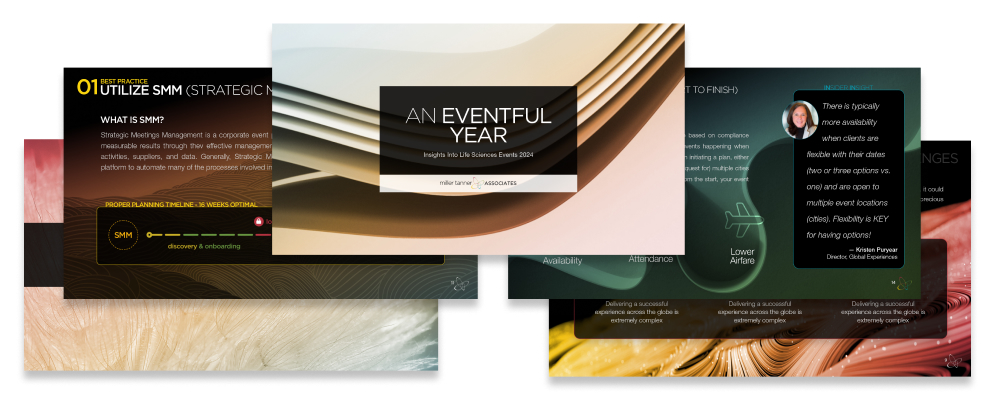
Our Miller Tanner Associates (MTA) Global Sales Team comprised of Dawn Barnes, Director of Global Sales, along with Diana Reed, Key Accounts Manager, and Lauren Beegal, Senior Business Development Manager, share with us all the latest trends and tips for planning successful investigator meetings (IM).
Investigator Meetings: Q & A
What are some of the latest trends you are seeing with investigator meetings?
Dawn: Companies are branching out to have fewer traditional speaker PowerPoint presentations be replaced with more interactive sessions like panels for Q&A versus round-table working group discussions during investigator meetings. While investigator meeting agenda lengths have been reduced over time, technology is now being more utilized to show real-time data and give immediate results through audience polling for content retention through content engagement platforms like ARS.
Diana: I think integrating technology into our events to enhance audience engagement is a hot topic with our clients at the moment; we are able to work within our own platforms and partner with various vendors to achieve maximum participation in our events.
Lauren: The current trends are use of technology not only to plan a more efficient, paperless meeting, but also incorporate the latest technology advances to engage attendees through live-result polling, gamification, and enhanced presentations. We recently incorporated a hologram speaker at one of our meetings, which immediately gained the attention of everyone in the room.
What are the benefits of a face-to-face (F2F) versus a virtual investigator meeting?
Dawn: While cost is a factor that all clients consider upfront when planning an event, we believe there is no better money spent than having that personal interaction and face-to-face time with their audience. Peer-to-peer sharing continues to help guide the development process and ensure patient enrollment success. However, there is a time and a place for a virtual event within the overall development planning cycle. For instance, if there is a protocol amendment, clients don’t have to spend unplanned funds having extra monitoring visits per site when they can reinforce the new updates or changes all at once to all sites simultaneously through virtual means.
Diana: Time spent at face-to-face meetings are crucial not only for the meeting sponsor but it is also time for investigators to come together and network within their industry. They are able to collaborate more as a group and collectively discuss important topics and ideas around the clinical study.
Lauren: Often the benefits of a face-to-face meeting are the intangibles that are hard to quantify. The ability to connect while sharing a meal, discussion, coffee break, or crossing paths in the hallway are instrumental in developing and nurturing relationships.
What type of event do healthcare providers (HCPs) prefer?
Dawn: The U.S. and European Union (EU) are much more open to virtual events as it has become more of a common occurrence. However, in regions like South America or Asia Pacific, they still prefer face-to-face culturally. In our experience, U.S. sites prefer events taking place towards the end of the work week or even over a weekend versus while in the EU they prefer during the work week. This is based upon our global experience as well as attendee direct feedback from our post-event surveys completed after every event.
Diana: I believe that HCPs prefer to attend an investigator meeting face-to-face, but appreciate an agenda that is applicable to their involvement in the study; the less time out of the office, the better. Providing online training/presentations ahead of the meeting will save on time at the investigator meeting and, therefore, HCPs will be more willing to attend.
Lauren: The majority of the HCPs recognize and value a face-to-face meeting; they are more appreciative when the meeting is thoughtfully planned and executed in order to justify their time and attendance while being away from their patients.
What are the biggest challenges when planning an investigator meeting?
Dawn: One challenge is having advanced lead-time for effective planning of the actual event – timelines continue to be reduced to bring an event to life. This challenges us given the amount of upfront activities required to get a budget agreed, locate the right venue, secure the hotel contract, negotiate the best deal for our clients to get invites launched all the while ensuring compliance for healthcare provider spend reporting and their respective country codes of conduct.
Diana: The time leading up to the meeting is a challenge. We have less and less time to plan and get investigators to the meeting.
Lauren: There can be hesitancy to enhance a meeting to ensure it is as efficient, effective, and engaging as possible. This is particularly true when the investigator meeting is part of a series of meetings. Although most companies tend to have a similar meeting objective to engage the attendees, the tendency is to repeat what has been done previously instead of utilizing new approaches due to perceived cost or time restraints.
What are some key strategies for launching a successful investigator meeting?
Dawn: Understanding our client’s vision for their event is key in order to have an effective strategy to implement and execute within the available timelines. Knowing our client’s event must-haves versus nice-to-haves based upon partnership experience allows us to “repeat” their prior events for consistency and approach to yield success.
Diana: A lot of our clients want to invest in technology to enhance the meeting experience, but they do not know how to use it. MTA will partner with their clients on working through their agenda, presentations, and meeting schedule to incorporate this investment.
Lauren: In this fast-paced industry, it is important to take a step back and understand the big-picture goals for the meeting. Once goals are identified, my strategy is to ensure that decisions being made throughout the planning process achieve those goals.
How much time is needed to plan an investigator meeting?
Dawn: We recommend 10-12 weeks of planning from invitation launch to event date. Time sometimes is a challenge for our clients though so we try to streamline the planning process upfront wherever we can to accommodate reduced timelines; however, advanced notice to sites to block dates is key when a timeline is less than 10 weeks in order to ensure high attendance ratios for their event.
Diana: I think 3 months is ideal, but 10 weeks is sufficient.
What’s the first step?
Dawn: Once an investigator meeting has been awarded to MTA, our first step is holding a joint Kick-Off Meeting which includes cross-functional representation internally like Sales, Project Development, Global Events, and Compliance to discuss the following:
-
-
-
- Overall goals and objectives of client/event
- Defining success with client for their investigator meeting
- Understanding expectations for all parties/roles involved
- Reviewing timeline of activities that lead up to the event date – client versus MTA
- Outlining the agenda and its technical requirements inside the room
- Addressing logistics questions
- Documenting agreements and next steps for weekly planning calls
-
-
If you have an upcoming investigator meeting on the horizon, let our team of expert event planners assist with your planning details.
Get Help Planning Your Next Investigator Meeting

